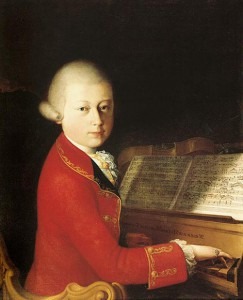 “Minors of the Majors” invites you to discover compositions by the great classical composers that for one reason or another have not reached the musical mainstream. Please enjoy, and keep listening!
“Minors of the Majors” invites you to discover compositions by the great classical composers that for one reason or another have not reached the musical mainstream. Please enjoy, and keep listening!
Exsultate Jubilate (Exult, rejoice) K. 165 is one of Wolfgang Amadeus Mozart’s most popular sacred compositions. It was written in 1773, when Mozart made his final journey to Italy to supervise the performance of his newest opera Lucio Silla. The opera prominently featured the castrato Venanzio Rauzzini, and by additionally composing the setting of Exsultate Jubilate for his opera star, the sixteen-year-old Mozart took advantage of the castrato’s fame to further advertise his compositional abilities. However, just a couple of years earlier Mozart had fashioned a similar work for Maria Magdalena Lipp, wife of Michael Haydn and soprano soloist at Salzburg Cathedral. Written in May 1771, shortly after Wolfie returned from an extended journey to Naples, the ceremonial setting of the Marian antiphon Regina Coeli features two outer movements for chorus set against an ornate orchestral background. In keeping with the tradition of Neapolitan church music, the central two movements are gentle arias primarily given to the soloist. The soprano melodies contain florid passages and wide leaps that could easily originate in one of Mozart’s operas. Mozart’s sacred music did not attempt to separate sacred musical styles from secular ones. In fact, he loved to have solo voices emerge from the choir, and colorful and bubbly orchestras or chamber ensembles contributed a sense of joy to the music of the church. Apparently, the original version entirely lacked the parts for the viola. This was no accident or a Mozartian slight against an entire instrumental group. Rather, in 1771 the Salzburg Cathedral orchestra could not find suitable violists so they simply left that position vacant. Mozart wrote a total of three settings on this particular Marian text, each of them evoking an atmosphere of exuberance, triumph and magnificence. Do you know them all?
Wolfgang Amadeus Mozart: Regina Coeli, K. 108
You May Also Like
- Minors of the Majors
Francis Poulenc: Sonata for Trumpet, Horn and Trombone, Op.33 Jean Cocteau magnanimously announced in 1918, that his principal goal was the elimination of all foreign and specifically German elements from French music and culture. - Minors of the Majors
Franz Liszt: Cantantibus organis The 1860’s were not particularly kind to Franz Liszt. For one, the Tsar of Russia successfully blocked his long-awaited marriage to the Princess Carolyne Sayn-Wittgenstein. - Minors of the Majors
Gustav Mahler: Piano Quartet in A Minor Gustav Mahler, son of an aspiring tavern proprietor and a soap-maker’s daughter, was considered a Wunderkind! - Minors of the Majors
Gioacchino Rossini: 3 Choeurs Religieux In 1829, Gioachino Rossini (1792-1868) completed his thirty-fourth opera, William Tell.
More Anecdotes
- Bach Babies in Music
Regina Susanna Bach (1742-1809) Learn about Bach's youngest surviving child - Bach Babies in Music
Johanna Carolina Bach (1737-81) Discover how family and crisis intersected in Bach's world - Bach Babies in Music
Johann Christian Bach (1735-1782) From Soho to the royal court: Johann Christian Bach's London success story - A Tour of Boston, 1924
Vernon Duke’s Homage to Boston Listen to pianist Scott Dunn bring this musical postcard to life
